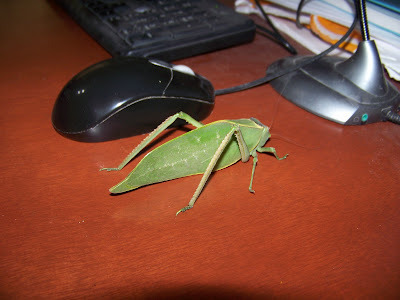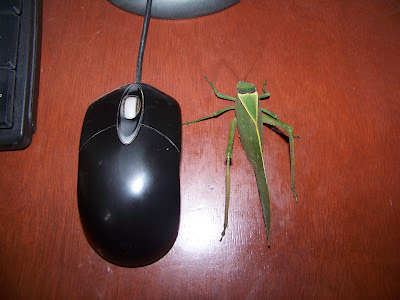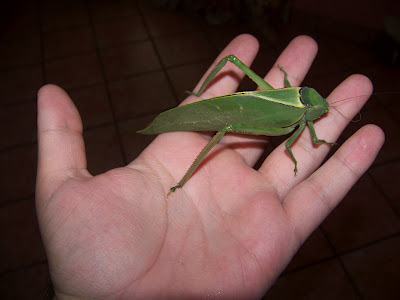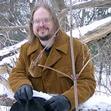Gordon Grice's Blog, page 39
November 7, 2012
THE EYES OF THE PANTHER
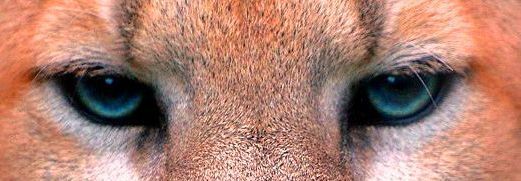
A Wildlife Classic
by Ambrose Bierce
I
ONE DOES NOT ALWAYS MARRY WHEN INSANE
A man and a woman--nature had done the grouping--sat on a
rustic seat, in the late afternoon. The man was middle-aged, slender, swarthy,
with the expression of a poet and the complexion of a pirate--a man at whom one
would look again. The woman was young, blonde, graceful, with something in her
figure and movements suggesting the word "lithe." She was habited in
a gray gown with odd brown markings in the texture. She may have been
beautiful; one could not readily say, for her eyes denied attention to all
else. They were gray-green, long and narrow, with an expression defying
analysis. One could only know that they were disquieting. Cleopatra may have
had such eyes.
The man and the woman talked.
"Yes," said the woman, "I love you, God
knows! But marry you, no. I cannot, will not."
"Irene, you have said that many times, yet always have
denied me a reason. I've a right to know, to understand, to feel and prove my
fortitude if I have it. Give me a reason."
"For loving you?"
The woman was smiling through her tears and her pallor. That
did not stir any sense of humor in the man.
"No; there is no reason for that. A reason for not
marrying me. I've a right to know. I must know. I will know!"
He had risen and was standing before her with clenched
hands, on his face a frown--it might have been called a scowl. He looked as if
he might attempt to learn by strangling her. She smiled no more--merely sat
looking up into his face with a fixed, set regard that was utterly without
emotion or sentiment. Yet it had something in it that tamed his resentment and
made him shiver.
"You are determined to have my reason?" she asked
in a tone that was entirely mechanical--a tone that might have been her look
made audible.
"If you please--if I'm not asking too much."
Apparently this lord of creation was yielding some part of
his dominion over his co-creature.
"Very well, you shall know: I am insane."
The man started, then looked incredulous and was conscious
that he ought to be amused. But, again, the sense of humor failed him in his
need and despite his disbelief he was profoundly disturbed by that which he did
not believe. Between our convictions and our feelings there is no good
understanding.
"That is what the physicians would say," the woman
continued--"if they knew. I might myself prefer to call it a case of
'possession.' Sit down and hear what I have to say."
The man silently resumed his seat beside her on the rustic
bench by the wayside. Over-against them on the eastern side of the valley the
hills were already sunset-flushed and the stillness all about was of that
peculiar quality that foretells the twilight. Something of its mysterious and
significant solemnity had imparted itself to the man's mood. In the spiritual,
as in the material world, are signs and presages of night. Rarely meeting her
look, and whenever he did so conscious of the indefinable dread with which,
despite their feline beauty, her eyes always affected him, Jenner Brading
listened in silence to the story told by Irene Marlowe. In deference to the
reader's possible prejudice against the artless method of an unpractised
historian the author ventures to substitute his own version for hers.
II
A ROOM MAY BE TOO NARROW FOR THREE, THOUGH ONE IS OUTSIDE
In a little log house containing a single room sparely and
rudely furnished, crouching on the floor against one of the walls, was a woman,
clasping to her breast a child. Outside, a dense unbroken forest extended for
many miles in every direction. This was at night and the room was black dark:
no human eye could have discerned the woman and the child. Yet they were
observed, narrowly, vigilantly, with never even a momentary slackening of
attention; and that is the pivotal fact upon which this narrative turns.
Charles Marlowe was of the class, now extinct in this
country, of woodmen pioneers--men who found their most acceptable surroundings
in sylvan solitudes that stretched along the eastern slope of the Mississippi Valley, from the Great
Lakes to the Gulf of Mexico. For
more than a hundred years these men pushed ever westward, generation after
generation, with rifle and ax, reclaiming from Nature and her savage children
here and there an isolated acreage for the plow, no sooner reclaimed than
surrendered to their less venturesome but more thrifty successors. At last they
burst through the edge of the forest into the open country and vanished as if
they had fallen over a cliff. The woodman pioneer is no more; the pioneer of the
plains--he whose easy task it was to subdue for occupancy two-thirds of the
country in a single generation--is another and inferior creation. With Charles
Marlowe in the wilderness, sharing the dangers, hardships and privations of
that strange, unprofitable life, were his wife and child, to whom, in the
manner of his class, in which the domestic virtues were a religion, he was
passionately attached. The woman was still young enough to be comely, new
enough to the awful isolation of her lot to be cheerful. By withholding the
large capacity for happiness which the simple satisfactions of the forest life
could not have filled, Heaven had dealt honorably with her. In her light
household tasks, her child, her husband and her few foolish books, she found
abundant provision for her needs.
One morning in midsummer Marlowe took down his rifle from
the wooden hooks on the wall and signified his intention of getting game.
"We've meat enough," said the wife; "please
don't go out to-day. I dreamed last night, O, such a dreadful thing! I cannot
recollect it, but I'm almost sure that it will come to pass if you go
out."
It is painful to confess that Marlowe received this solemn
statement with less of gravity than was due to the mysterious nature of the
calamity foreshadowed. In truth, he laughed.
"Try to remember," he said. "Maybe you
dreamed that Baby had lost the power of speech."
The conjecture was obviously suggested by the fact that
Baby, clinging to the fringe of his hunting-coat with all her ten pudgy thumbs
was at that moment uttering her sense of the situation in a series of exultant
goo-goos inspired by sight of her father's raccoon-skin cap.
The woman yielded: lacking the gift of humor she could not
hold out against his kindly badinage. So, with a kiss for the mother and a kiss
for the child, he left the house and closed the door upon his happiness
forever.
At nightfall he had not returned. The woman prepared supper
and waited. Then she put Baby to bed and sang softly to her until she slept. By
this time the fire on the hearth, at which she had cooked supper, had burned
out and the room was lighted by a single candle. This she afterward placed in
the open window as a sign and welcome to the hunter if he should approach from
that side. She had thoughtfully closed and barred the door against such wild
animals as might prefer it to an open window --of the habits of beasts of prey
in entering a house uninvited she was not advised, though with true female
prevision she may have considered the possibility of their entrance by way of
the chimney. As the night wore on she became not less anxious, but more drowsy,
and at last rested her arms upon the bed by the child and her head upon the
arms. The candle in the window burned down to the socket, sputtered and flared
a moment and went out unobserved; for the woman slept and dreamed.
In her dreams she sat beside the cradle of a second child.
The first one was dead. The father was dead. The home in the forest was lost
and the dwelling in which she lived was unfamiliar. There were heavy oaken
doors, always closed, and outside the windows, fastened into the thick stone
walls, were iron bars, obviously (so she thought) a provision against Indians.
All this she noted with an infinite self-pity, but without surprise--an emotion
unknown in dreams. The child in the cradle was invisible under its coverlet
which something impelled her to remove. She did so, disclosing the face of a
wild animal! In the shock of this dreadful revelation the dreamer awoke,
trembling in the darkness of her cabin in the wood.
As a sense of her actual surroundings came slowly back to
her she felt for the child that was not a dream, and assured herself by its
breathing that all was well with it; nor could she forbear to pass a hand
lightly across its face. Then, moved by some impulse for which she probably
could not have accounted, she rose and took the sleeping babe in her arms,
holding it close against her breast. The head of the child's cot was against
the wall to which the woman now turned her back as she stood. Lifting her eyes
she saw two bright objects starring the darkness with a reddish-green glow. She
took them to be two coals on the hearth, but with her returning sense of
direction came the disquieting consciousness that they were not in that quarter
of the room, moreover were too high, being nearly at the level of the eyes--of
her own eyes. For these were the eyes of a panther.
The beast was at the open window directly opposite and not
five paces away. Nothing but those terrible eyes was visible, but in the
dreadful tumult of her feelings as the situation disclosed itself to her
understanding she somehow knew that the animal was standing on its hinder feet,
supporting itself with its paws on the window-ledge. That signified a malign
interest--not the mere gratification of an indolent curiosity. The
consciousness of the attitude was an added horror, accentuating the menace of
those awful eyes, in whose steadfast fire her strength and courage were alike
consumed. Under their silent questioning she shuddered and turned sick. Her
knees failed her, and by degrees, instinctively striving to avoid a sudden
movement that might bring the beast upon her, she sank to the floor, crouched
against the wall and tried to shield the babe with her trembling body without
withdrawing her gaze from the luminous orbs that were killing her. No thought
of her husband came to her in her agony--no hope nor suggestion of rescue or
escape. Her capacity for thought and feeling had narrowed to the dimensions of
a single emotion--fear of the animal's spring, of the impact of its body, the
buffeting of its great arms, the feel of its teeth in her throat, the mangling
of her babe. Motionless now and in absolute silence, she awaited her doom, the
moments growing to hours, to years, to ages; and still those devilish eyes
maintained their watch.
Returning to his cabin late at night with a deer on his
shoulders Charles Marlowe tried the door. It did not yield. He knocked; there
was no answer. He laid down his deer and went round to the window. As he turned
the angle of the building he fancied he heard a sound as of stealthy footfalls
and a rustling in the undergrowth of the forest, but they were too slight for
certainty, even to his practised ear. Approaching the window, and to his surprise
finding it open, he threw his leg over the sill and entered. All was darkness
and silence. He groped his way to the fire-place, struck a match and lit a
candle.
Then he looked about. Cowering on the floor against a wall
was his wife, clasping his child. As he sprang toward her she rose and broke
into laughter, long, loud, and mechanical, devoid of gladness and devoid of
sense--the laughter that is not out of keeping with the clanking of a chain.
Hardly knowing what he did he extended his arms. She laid the babe in them. It
was dead--pressed to death in its mother's embrace.
III
THE THEORY OF THE DEFENSE
That is what occurred during a night in a forest, but not
all of it did Irene Marlowe relate to Jenner Brading; not all of it was known
to her. When she had concluded the sun was below the horizon and the long
summer twilight had begun to deepen in the hollows of the land. For some
moments Brading was silent, expecting the narrative to be carried forward to
some definite connection with the conversation introducing it; but the narrator
was as silent as he, her face averted, her hands clasping and unclasping
themselves as they lay in her lap, with a singular suggestion of an activity
independent of her will.
"It is a sad, a terrible story," said Brading at
last, "but I do not understand. You call Charles Marlowe father; that I
know. That he is old before his time, broken by some great sorrow, I have seen,
or thought I saw. But, pardon me, you said that you--that you--"
"That I am insane," said the girl, without a
movement of head or body.
"But, Irene, you say--please, dear, do not look away
from me--you say that the child was dead, not demented."
"Yes, that one--I am the second. I was born three
months after that night, my mother being mercifully permitted to lay down her
life in giving me mine."
Brading was again silent; he was a trifle dazed and could
not at once think of the right thing to say. Her face was still turned away. In
his embarrassment he reached impulsively toward the hands that lay closing and
unclosing in her lap, but something--he could not have said what-- restrained
him. He then remembered, vaguely, that he had never altogether cared to take
her hand.
"Is it likely," she resumed, "that a person
born under such circumstances is like others--is what you call sane?"
Brading did not reply; he was preoccupied with a new thought
that was taking shape in his mind--what a scientist would have called an
hypothesis; a detective, a theory. It might throw an added light, albeit a
lurid one, upon such doubt of her sanity as her own assertion had not
dispelled.
The country was still new and, outside the villages,
sparsely populated. The professional hunter was still a familiar figure, and
among his trophies were heads and pelts of the larger kinds of game. Tales
variously credible of nocturnal meetings with savage animals in lonely roads
were sometimes current, passed through the customary stages of growth and
decay, and were forgotten. A recent addition to these popular apocrypha,
originating, apparently, by spontaneous generation in several households, was
of a panther which had frightened some of their members by looking in at
windows by night. The yarn had caused its little ripple of excitement--had even
attained to the distinction of a place in the local newspaper; but Brading had
given it no attention. Its likeness to the story to which he had just listened
now impressed him as perhaps more than accidental. Was it not possible that the
one story had suggested the other--that finding congenial conditions in a
morbid mind and a fertile fancy, it had grown to the tragic tale that he had
heard?
Brading recalled certain circumstances of the girl's history
and disposition, of which, with love's incuriosity, he had hitherto been
heedless--such as her solitary life with her father, at whose house no one,
apparently, was an acceptable visitor and her strange fear of the night, by
which those who knew her best accounted for her never being seen after dark.
Surely in such a mind imagination once kindled might burn with a lawless flame,
penetrating and enveloping the entire structure. That she was mad, though the
conviction gave him the acutest pain, he could no longer doubt; she had only
mistaken an effect of her mental disorder for its cause, bringing into imaginary
relation with her own personality the vagaries of the local myth-makers. With
some vague intention of testing his new "theory," and no very
definite notion of how to set about it he said, gravely, but with hesitation:
"Irene, dear, tell me--I beg you will not take offence,
but tell me--"
"I have told you," she interrupted, speaking with
a passionate earnestness that he had not known her to show--"I have
already told you that we cannot marry; is anything else worth saying?"
Before he could stop her she had sprung from her seat and
without another word or look was gliding away among the trees toward her
father's house. Brading had risen to detain her; he stood watching her in
silence until she had vanished in the gloom. Suddenly he started as if he had
been shot; his face took on an expression of amazement and alarm: in one of the
black shadows into which she had disappeared he had caught a quick, brief
glimpse of shining eyes! For an instant he was dazed and irresolute; then he
dashed into the wood after her, shouting: "Irene, Irene, look out! The
panther! The panther!"
In a moment he had passed through the fringe of forest into
open ground and saw the girl's gray skirt vanishing into her father's door. No
panther was visible.
IV
AN APPEAL TO THE CONSCIENCE OF GOD
Jenner Brading, attorney-at-law, lived in a cottage at the
edge of the town. Directly behind the dwelling was the forest. Being a
bachelor, and therefore, by the Draconian moral code of the time and place
denied the services of the only species of domestic servant known thereabout,
the "hired girl," he boarded at the village hotel, where also was his
office. The woodside cottage was merely a lodging maintained--at no great cost,
to be sure--as an evidence of prosperity and respectability. It would hardly do
for one to whom the local newspaper had pointed with pride as "the
foremost jurist of his time" to be "homeless," albeit he may
sometimes have suspected that the words "home" and "house"
were not strictly synonymous. Indeed, his consciousness of the disparity and
his will to harmonize it were matters of logical inference, for it was
generally reported that soon after the cottage was built its owner had made a
futile venture in the direction of marriage--had, in truth, gone so far as to
be rejected by the beautiful but eccentric daughter of Old Man Marlowe, the
recluse. This was publicly believed because he had told it himself and she had
not--a reversal of the usual order of things which could hardly fail to carry
conviction.
Brading's bedroom was at the rear of the house, with a
single window facing the forest.
One night he was awakened by a noise at that window; he
could hardly have said what it was like. With a little thrill of the nerves he
sat up in bed and laid hold of the revolver which, with a forethought most
commendable in one addicted to the habit of sleeping on the ground floor with
an open window, he had put under his pillow. The room was in absolute darkness,
but being unterrified he knew where to direct his eyes, and there he held them,
awaiting in silence what further might occur. He could now dimly discern the
aperture--a square of lighter black. Presently there appeared at its lower edge
two gleaming eyes that burned with a malignant lustre inexpressibly terrible!
Brading's heart gave a great jump, then seemed to stand still. A chill passed
along his spine and through his hair; he felt the blood forsake his cheeks. He
could not have cried out--not to save his life; but being a man of courage he
would not, to save his life, have done so if he had been able. Some trepidation
his coward body might feel, but his spirit was of sterner stuff. Slowly the
shining eyes rose with a steady motion that seemed an approach, and slowly rose
Brading's right hand, holding the pistol. He fired!
Blinded by the flash and stunned by the report, Brading
nevertheless heard, or fancied that he heard, the wild, high scream of the
panther, so human in sound, so devilish in suggestion. Leaping from the bed he
hastily clothed himself and, pistol in hand, sprang from the door, meeting two
or three men who came running up from the road. A brief explanation was
followed by a cautious search of the house. The grass was wet with dew; beneath
the window it had been trodden and partly leveled for a wide space, from which
a devious trail, visible in the light of a lantern, led away into the bushes.
One of the men stumbled and fell upon his hands, which as he rose and rubbed
them together were slippery. On examination they were seen to be red with
blood.
An encounter, unarmed, with a wounded panther was not
agreeable to their taste; all but Brading turned back. He, with lantern and
pistol, pushed courageously forward into the wood. Passing through a difficult
undergrowth he came into a small opening, and there his courage had its reward,
for there he found the body of his victim. But it was no panther. What it was
is told, even to this day, upon a weather-worn headstone in the village
churchyard, and for many years was attested daily at the graveside by the bent
figure and sorrow-seamed face of Old Man Marlowe, to whose soul, and to the
soul of his strange, unhappy child, peace. Peace and reparation.

Published on November 07, 2012 22:16
November 6, 2012
Katydid
Published on November 06, 2012 23:42
November 5, 2012
Cape Hunting Dogs Kill Toddler

Cape Hunting Dogs Devouring a Wildebeest (Masteraah/Creative Commons)
A hideous accident at the Pittsburgh zoo caused the death of a two-year-old boy. News reports like the one linked below describe a visitors and staff trying to frighten the 11 Cape hunting dogs away from the boy. They apparently needed ten minutes to get the most persistent dog to stop his attack. That dog was shot to death.
Cape hunting dogs, also called African wild dogs or painted wolves, are notoriously effective predators. Their pack-attacks on hoofed animals have been documented many times. However, they don't normally prey on people. One source claims there are no recorded cases of attacks on humans in the wild. Like many other animals, they are uniquely dangerous in captivity.
Painted dogs maul, kill 2-year-old at Pittsburgh Zoo | TribLIVE:
"A 2-year-old boy whose mother lifted him onto a railing to see the African painted dogs at the Pittsburgh Zoo & PPG Aquarium fell into the exhibit, where the animals attacked and killed him Sunday morning in front of horrified onlookers."
Thanks to James fro the news tip.

Published on November 05, 2012 00:21
November 4, 2012
Blind

When I was very small my grandfather lived on what was
called the college farm. In his kitchen stood a glass canister like the ones
you’d see in a doctor’s office, but this one filled with soda crackers. Net-bags
of peanuts in the shell lay ready to yield to my thumbs not just the meat, but
the woody scent. A bowl full of walnuts and pecans served as centerpiece. It
looked like, and maybe was, a cross-section of a tree, bark still attached. In
its center an array of picks bristled on a perforated cork, like quills on a
porcupine. I would sit for hours (at least it seemed like hours to me) mastering
the leverage of the nutcracker and working
every scrap of nut meat out of a walnut shell.
In the living room, a corner near the door was full of scrap
lumber and hammers and nails and saws and drills. I generated a lot of sawdust
with these. In a bedroom my sister and I found a box of toys--a plastic
soldier, a doll perversely clad in red fur, a stuffed monkey. My mother said
they had been her toys when she was little. Inconceivable relics from the days
of dinosaurs.
Things were always growing there. I saw, for the first time,
newborn kittens, blind and shivering, each paw like a domino with its pink
pads, the claws fine as thistles. Puppies, too; Grampa’s black dog would lie on
the kitchen floor, puppies shoving each other out of the way to suckle. There
was always a runt who got left out, and I thought that was a great injustice. I
chased mice in the backyard where a pony named Sugar lived. Once I chased a
mouse under a board. I turned the board over and found a nest of pink baby
mice, and they were blind too.
The garden stretched to the horizon. At pea-picking time we
went along the rows with kitchen bowls. I ate the English peas raw when no one
was looking. I was too short to gather the corn, but I helped shuck it. The
husks felt like vinyl, and inside, among the strands of silk, were green and
black caterpillars. They moved their heads around awkwardly, as if they’d just
been awakened. Maybe they had spent their whole lives eating corn from the
inside and had never seen the light before.
Photo by Wayne T. Allison

Published on November 04, 2012 23:30
November 3, 2012
Finches
Published on November 03, 2012 23:00
A Male Black Wdiow


Croconut found and photographed this fellow in his house. The males are considered harmless, but you really don't want them bringing over any lady friends. . . .

Published on November 03, 2012 14:04
November 1, 2012
Wild Boar Hurts Four in Berlin

Richard Bartz/Creative Commons
Four injured in wild boar attack - World News, Breaking News - Independent.ie:
"Four people have been injured in an attack by a wild boar in a residential area of Berlin.
Authorities said the 265lb animal was shot dead.
Police said the boar bit a 74-year-old man on the back and leg, and knocked a 74-year-old woman to the ground and injured her hip."
Other victims included a 24-year-old woman who tried to help by distracting the boar. She was injured before she escaped by climbing onto her car. Police officers eventually shot the boar to death, but not before it bit one of them. One report claims the animal had a broken leg, possibly the result of being struck by a vehicle. That might explain its aggression. Boar troubles aren't uncommon in Berlin, but this incident is one of the more extreme I've heard of.

Published on November 01, 2012 23:00
October 31, 2012
Wildlife Classics: Coyotes
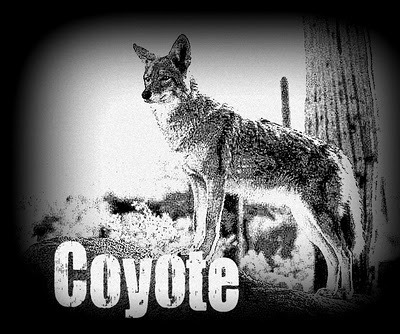
Accounts from
the American Frontier
The coyote's howl is more tonic
than all theories about nature.
--J. Frank Dobie
*
An Allegory of Want
Mark Twain
1872
The coyote is a long, slim, sick and sorry-looking skeleton,
with a gray wolf-skin stretched over it, a tolerably bushy tail that forever
sags down with a despairing expression of forsakenness and misery, a furtive
and evil eye, and a long, sharp face, with slightly lifted lip and exposed
teeth. He has a general slinking expression all over. The coyote is a living,
breathing allegory of Want. He is always hungry.
He is always poor, out of luck and friendless. The meanest
creatures despise him, and even the fleas would desert him for a velocipede. He
is so spiritless and cowardly that even while his exposed teeth are pretending
a threat, the rest of his face is apologizing for it. And he is so homely!--so
scrawny, and ribby, and coarse-haired, and pitiful. When he sees you he lifts
his lip and lets a flash of his teeth out, and then turns a little out of the
course he was pursuing, depresses his head a bit, and strikes a long,
soft-footed trot through the sage-brush, glancing over his shoulder at you,
from time to time, till he is about out of easy pistol range, and then he stops
and takes a deliberate survey of you; he will trot fifty yards and stop
again--another fifty and stop again; and finally the gray of his gliding body
blends with the gray of the sage-brush, and he disappears. All this is when you
make no demonstration against him; but if you do, he develops a livelier interest
in his journey, and instantly electrifies his heels and puts such a deal of
real estate between himself and your weapon, that by the time you have raised
the hammer you see that you need a minie rifle, and by the time you have got
him in line you need a rifled cannon, and by the time you have "drawn a
bead" on him you see well enough that nothing but an unusually long-winded
streak of lightning could reach him where he is now. But if you start a
swift-footed dog after him, you will enjoy it ever so much--especially if it is
a dog that has a good opinion of himself, and has been brought up to think he
knows something about speed.
The coyote will go swinging gently off on that deceitful
trot of his, and every little while he will smile a fraudful smile over his
shoulder that will fill that dog entirely full of encouragement and worldly
ambition, and make him lay his head still lower to the ground, and stretch his
neck further to the front, and pant more fiercely, and stick his tail out
straighter behind, and move his furious legs with a yet wilder frenzy, and
leave a broader and broader, and higher and denser cloud of desert sand smoking
behind, and marking his long wake across the level plain! And all this time the
dog is only a short twenty feet behind the coyote, and to save the soul of him
he cannot understand why it is that he cannot get perceptibly closer; and he
begins to get aggravated, and it makes him madder and madder to see how gently
the coyote glides along and never pants or sweats or ceases to smile; and he
grows still more and more incensed to see how shamefully he has been taken in
by an entire stranger, and what an ignoble swindle that long, calm, soft-footed
trot is; and next he notices that he is getting fagged, and that the coyote
actually has to slacken speed a little to keep from running away from him--and
then that town-dog is mad in earnest, and he begins to strain and weep and
swear, and paw the sand higher than ever, and reach for the coyote with
concentrated and desperate energy. This "spurt" finds him six feet
behind the gliding enemy, and two miles from his friends. And then, in the
instant that a wild new hope is lighting up his face, the coyote turns and
smiles blandly upon him once more, and with a something about it which seems to
say: "Well, I shall have to tear myself away from you, bub--business is
business, and it will not do for me to be fooling along this way all
day"--and forthwith there is a rushing sound, and the sudden splitting of
a long crack through the atmosphere, and behold that dog is solitary and alone
in the midst of a vast solitude!
It makes his head swim. He stops, and looks all around;
climbs the nearest sand-mound, and gazes into the distance; shakes his head
reflectively, and then, without a word, he turns and jogs along back to his
train, and takes up a humble position under the hindmost wagon, and feels
unspeakably mean, and looks ashamed, and hangs his tail at half-mast for a
week. And for as much as a year after that, whenever there is a great hue and cry
after a coyote, that dog will merely glance in that direction without emotion,
and apparently observe to himself, "I believe I do not wish any of the
pie."
The coyote lives chiefly in the most desolate and forbidding
desert, along with the lizard, the jackass-rabbit and the raven, and gets an
uncertain and precarious living, and earns it. He seems to subsist almost
wholly on the carcasses of oxen, mules and horses that have dropped out of
emigrant trains and died, and upon windfalls of carrion, and occasional
legacies of offal bequeathed to him by white men who have been opulent enough
to have something better to butcher than condemned army bacon.
We soon learned to recognize the sharp, vicious bark of the
coyote as it came across the murky plain at night to disturb our dreams among
the mail-sacks; and remembering his forlorn aspect and his hard fortune, made
shift to wish him the blessed novelty of a long day's good luck and a limitless
larder the morrow.
*
He saw a male coyote drag its belly along the ground to
distract the dogs, to give itself up while its mate ran to cover.
--William Least Heat-Moon
*
The Goods the Gods Gave
A. S. Barton
1909
I was mowing hay in my coulee, when I noticed, some distance
away, a Coyote carrying something in its mouth. He trotted down the hill and
with some difficulty through the long grass, but presently stopped and began to
bury his booty in a mole-heap, covering it with his nose, as a dog does. On my
approach he decamped and watched my proceedings from the nearest hill and,
curious to know what he had been burying, I unearthed his cache, and found, to
my surprise, a fine turkey gobbler, still warm and uninjured, except that its
neck was broken. I had no time and less inclination to advertise for an owner,
but accepted "the goods the gods gave" and carried my prize home.
*
Fierce Rascals
Richard Henry Dana
1840
Wooding excursions had always a mixture of something rather
pleasant in them. Roaming about in the
woods with hatchet in hand, like a backwoodsman, followed by a troop of dogs;
starting up of birds, snakes, hares and foxes, and examining the various kinds
of trees, flowers, and birds' nests, was at least, a change from the monotonous
drag and pull on shipboard. Frequently,
too, we had some amusement and adventure.
The coyote, fierce little animals, with bushy tails and large heads, and
a quick, sharp bark, abound here, as in all other parts of California. These, the dogs were very watchful for, and
whenever they saw them, started off in full run after them. We had many fine chases; yet, although our
dogs ran finely, the rascals generally escaped. Pursuit by us was in vain, and
in about half an hour a few of the dogs would come panting and straggling back.
*
The coyotes bark still in the woods, for they belong not to
man, and are not touched by his changes.
--Richard Henry Dana

Published on October 31, 2012 22:01
October 30, 2012
Workman Jumping Spider
Published on October 30, 2012 22:03
October 29, 2012
Grice Too Gory for Google
You may have noticed that Google Ads no longer grace this
site. I placed the ads on my site in July, hoping to make a little money toward
the upkeep of this blog. The other day, Google told me my ads were suspended.
Why? Violence and gore. Turns out you’re not allowed to put violence or gore on
the same page as any ads. Here’s the post that drew the ban:
http://deadlykingdom.blogspot.com/2012/06/animal-attack-movies-alien.html
That’s right: A review of a movie. After all the real-life
mayhem I’ve run on these pages, all the stories of limbs bitten off and human
beings devoured, Google took issue with a puppet drenched in corn syrup and
food dye. But this is only an example page. Google advises me to check my other pages and sites for "compliance." I have to clean up all of them if I want my ads back. I think I’ll
pass. You readers will have to get used to not seeing ads for Korean dating and
online degrees here.

Gratuitous Gore
The nifty thing for Google is that they don’t pay until
you’ve earned a certain amount of ad money. If you stop earning before
then—because, say, they banned you—then Google pockets the money. You’ve helped
them advertise—for free. Am I being cynical?

Published on October 29, 2012 23:00



